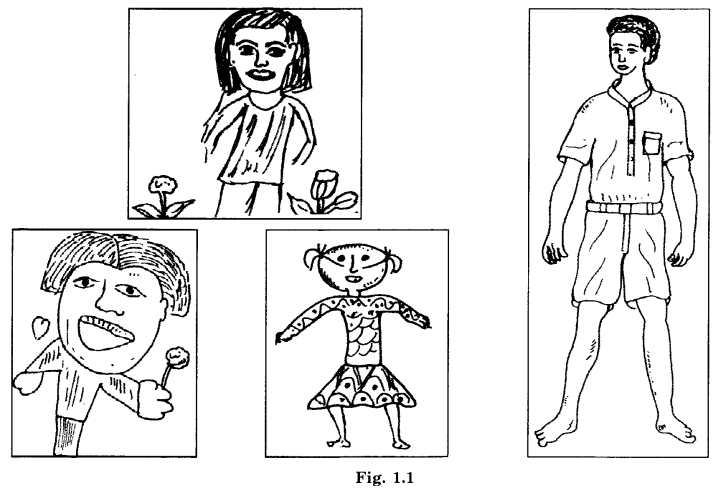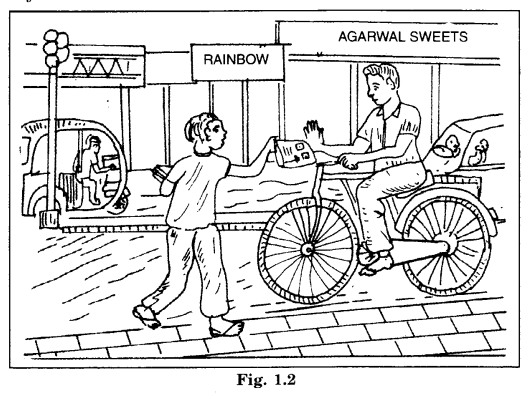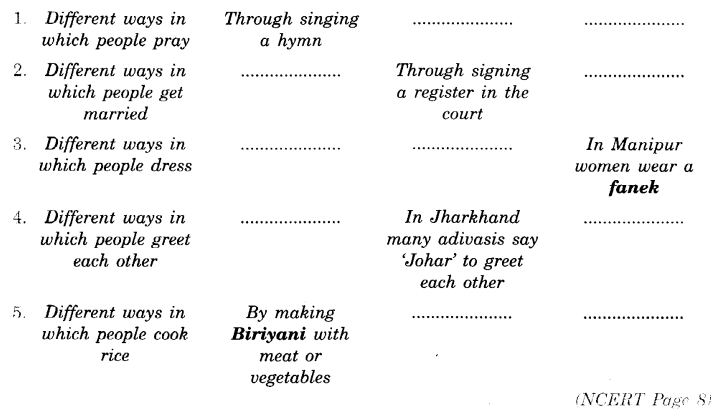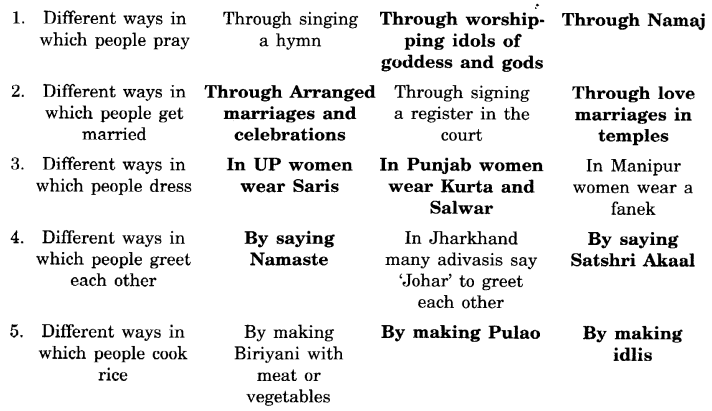GetStudySolution
Getstudysolution is an online educational platform that allows students to access quality educational services and study materials at no cost.
NCERT Solutions for class 6 Civics Chapter 1 – Understanding Diversity
Back Exercise
1. Draw up a list of the different festivals celebrated in your locality. Which of these celebrations are shared by members of different regional and religious communities?Answer
• Holi : Hindus (mainly in North India, North-east India, Orrisa, Mahrashtra, Tamil Nadu etc.)
• Diwali : Hindus (mainly in Central India, North India, North-east India, South India etc.)
• Id-ul-Fitr : Muslims (mainly in Central India, North India, North-east India, South India etc.)
• Christmas : Christians (mainly in Central India, North India, South India etc.)
• Pongal : Hindus (Tamil Nadu, Kerala)
• Chhath : Hindus (Bihar, Uttar Pradesh, Jharkhand)
• Lhori : Sikhs, Hindus (Punjab, Chandigarh)
• Mahavir Jayanti : Jains, Hindus (Chhatishgarh, U.P., Bihar)
• Buddha Jayanti : Buddhists, Hindus (U.P., Maharshtra, M.P.)
2. What do you think living in India with its rich heritage of diversity adds to your life?
Answer
Things which rich heritage of diversity adds to your life:
• We met people with different languages.
• We have large variety in foods.
• Celebrate different festivals and respect their cultures.
• Different dance and music forms.
• Variety of dressing styles and clothes of the regions.
3. Do you think the term "unity in diversity" is an appropriate term to describe India? What do you think Nehru is trying to say about Indian unity in the sentence quoted above from his book The Discovery of India?
Answer
Yes, the term "unity in diversity" is an appropriate term to describe India. The diversity in India has always been recognised as a source of its strength. Even during freedom movements, women and men from different cultural, religious and regional backgrounds came together to decide joint
actions and opposes the British rule. This strength of unity made it very hard for Britishers to continue the rule and Indians won the battle of independence. Also, the same national flag was used as means of protest against Britishers everywhere.
In his book The Discovery of India Jawaharlal Nehru says that Indian unity is not something imposed from the outside but rather it was something deeper and within its fold, the widest tolerance of belief and custom was practised and every variety acknowledged and even encouraged. This suggests that despite of having geographical, language and cultural differences, people of India are living with peace with respect for each others traditions and with unity.
4. Underline the line in the poem sung after the Jallianwala Bagh massacre, which according to you, reflects India's essential unity.
Answer
The blood of Hindus and Muslims flows together today. This line in the poem sung after the Jallianwala Bagh massacre reflects India's essential unity.
5. Choose another region in India and do a similar study of the historical and geographical factors that influence the diversity found there. Are these historical and geographical factors connected to each other? How?
Answer
Region: West Bengal
Geographical Factors: Lies in the regions of Ganges-Brahmputra Delta. It stretches from the Himalayas in the north to the Bay of Bengal in the south. A small coastal region is on the extreme south, while the Sundarbans forests is a remarkable landmark at the Ganges delta.
Historical Factors: It has close relations with geographical factors. The major population depends on agriculture or mainly the cultivation of rice due to fertile lands of Delta. The people of Bengal supported Bangladesh Liberation war. Durga Puja of Hindus and Eid of Muslims are two main festival celebrated in Bengal.
Region: Kerala
Geographical Features: Situated between the Lakshadweep Sea and the Western Ghats. It has a wet and maritime tropical climate influenced by the seasonal heavy rains. The western coastal belt is relatively flat compared to the eastern region and have many lakes and canals.
Historical Factors: Due to coastal areas, export and import were prevalent and thus there are people from many religions. This state has nearly equal population from Hinduism, Muslims and Christian regions. Festivals like Onam, Eid, Christmas etc. are celebrated. The geographical features helped in the cultivation of spices.
In-Text Questions
Question 1.
Look around you in the classroom: do you see anyone who looks exactly like you do? (NCERT Page 3)
Answer:
No.
Question 2.
What does diversity add to our lives?
Answer:
Diversity adds to our lives knowledge about the following:
- Different ways of living.
- Different languages, dialects.
- Different customs and traditions.
- Different rituals.
- Different attitudes towards lives.
Question 3.
How did India become like this? (NCERT Page 3)
Answer:
India became like this due to unity in diversities.
- All the Indians are one.
- They love their motherland more than their lives.
- They are always ready to sacrifice their lives at the alter of their motherland.
- They are ready to protect and preserve the unity and integrity of India at all costs.
Question 4.
Are all kinds of difference a part of diversity?
Answer:
Yes.
Question 5.
Can diversity also be a part of unity? (NCERT Page 3)
Answer:
Yes, diversity can also be a part of unity.
Question 6.
Three children around your age have drawn the Figures 1.1. Use the empty box to draw your human figure. Is your drawing similar to any of the others? The chances are that your drawing is quite different from the other three, which you can see are quite different from each other. (NCERT Page 3)
Answer:
It is different from each other because of the following:
- Our drawing style is different from each other
- We are different from each other both in
- form and looks
- languages
- Our cultural backgrounds are different
- Our religious rituals are different
- Our ways of drawing pictures are also different.

Question 7.
Question Box: (NCERT Page 4)
Fill out the following information about yourself
1. When I go out I like wearing
Answer:
Shirts, pants, socks and shoes.
2. At home I speak in
Answer:
Hindi and English.
3. My favourite sport is
Answer:
Cricket
4. I like reading books about
Answer:
Mahatma Gandhi, Jawaharlal Nehru, Dr. Ambedkar, Veer Savarkar, etc.
5. Now ask your teacher to help you check,
(i) How many of you have similar answers?
(ii) Is there anyone whose list matches yours exactly? Probably not. But many of you may have similar answers,
(iii) How many like reading the same kind of books?
(iv) How many different languages are spoken by the students in your class?
Answer:
(i) Not a single student as there is difference in writing style of each student.
(ii) Not at all.
(iii) Very few students.
(iv) Four languages-Hindi, Punjabi, Urdu and English.
Question 8.
By now you must have recognised the many ways in which you are quite like some of your classmates and other ways in which you are different from them. (NCERT Page 4)
Answer:
We are quite like some of our classmates in the following ways:
- We wear same clothes.
- We speak same languages.
- We like cricket the most.
We are different from others in the following ways:
- We do not like Mahatma Gandhi in the same ways as other boys.
- Our favourite festivals are different.
- We do not study and do homework in the same way as others do.
Question 9.
Do you think it would be easy for you to make friends with someone who was very different from you? Read the following story and think about this.
I had meant it as a joke. A joke for the small ragged boy who sold newspapers at the traffic light at the busy intersection. Everytime I cycled past he would run after me, holding out the English paper and screaming out the evening’s headlines in a mixture of Hindi and English. This time, I stopped by the pavement and asked for the Hindi paper. His mouth fell open. “You mean you know Hindi?” he asked.

‘Of course’, I said, as I paid him for the paper.
‘Why?’ What did you think?”
He paused. “But you look so… so angrez,” he said. “You mean you can even read Hindi?” ‘Of course I can,’ I said, this time a little impatiently. I can speak, read and write Hindi. Hindi is one of the subjects I study in school.”
‘Subjects?’ he asked. “What’s that?” How could I explain what a subject was to someone who had never been to school? “Well, it is something…”I began, but the lights changed, and the people behind me began honking so I let myself be pushed along with the rest of the traffic.
The next day he was there again, smiling at me and holding out a Hindi paper. “Bhaiyya,” he said, “aap ka akhbaar”. And then because the light was red, I asked him, “Have you ever been to school?” “Never,” he answered. And he added proudly, “I began working when I was this high.” He pointed to my cycle-seat. “First my mother used to come with me but now I can manage by myself.”
“Where is your mother now?” I asked, but then the lights changed I was off. I heard him yell from somewhere behind me, “She’s in Meerut with…” The rest was drowned in the noise of the traffic.
“My name is Samir,” he said the next day. And very shyly he asked, ‘What’s yours?’ I couldn’t believe it! My bicycle actually wobbled. “My name is Samir too,” I said. ‘What?’ His eyes lit up. Yes,’ I grinned at him. ‘It’s’ another name for Hanuman’s father, you know.” “So now you are Samir Ek and I’m Samir Do,” he said triumphantly. “Something like that,” I answered and then I held out my hand. “Haath milao, Samir Do!” His hand nestled in mine like a little bird. I could still feel its warmth as I cycled away.
The next day, he did not have his usual smile for me. “There is trouble in Meerut,” he said. I looked at the headlines. ‘Communal Riots’, the newspaper screamed. “But Samir…” I began. “I’m a Muslim Samir” he said in answer. “And all my people are in Meerut.” And when I touched his shoulder his eyes filled with tears. (NCERT Pages 4-5)
Answer:
People who are different from each other can become friends, because there is unity in diversity.
Emotional bond is that unity which brings the different people together and makes them friends.
Question 10.
Question Box: (NCERT Page 5)
Name three ways in which Samir Ek and Samir Do were different?
Did these differences prevent them from becoming friends?
Answer:
Samir Ek and Samir Do were different in the following three ways:
(a) Samir Ek knew English, Samir Do spoke in Hindi. He did not attend school.
(b) Samir Ek came from Hindu religion while Samir Do belonged to Muslim religion.
(c) Samir Ek was a student while Samir Do was a newspaper hawker.
No, these differences did not prevent them from becoming friends, because emotional bond bound them together and made them friends.
Question 11.
Question Box: (NCERT Page 6)
Make a list of the festivals that might have been celebrated by the two boys.
Samir Ek:
Samir Do:
Can you think of a situation in which you made friends .with someone who was very different from you? Write a story that describes this.
Answer:
| Persons | Festivals celebrated by them |
| Samir Ek | Deepawali |
| Holi | |
| Rakshabandhan | |
| Janmashtami | |
| Dussehra | |
| Samir Do | Idul-Fitr |
| Idul Zuha | |
| Muharram | |
| Prophet Mohammad’s Birthday. |
Yes, we can think of a situation in which we made friends with someone who was very different from us.
Now the students can tell a story of this event themselves.
Question 12.
Discuss:
Why do you think Samir Do did not attend school? Do you think it would have been easy for him to attend school if he wanted to? In your opinion is it a fair situation that some children get to go to school and others don’t? (NCERT Page 6)
Answer:
- Samir Do did not attend school due to the following reasons:
- He had to earn his own livelihood and for his mother.
- He did not have enough time to join a school.
- Yes, we think that it would have been easy for him to attend school if he wanted to, because of the following reasons:
- After selling newspapers he had enough time to attend school in evening shift.
- He would have been able to save some rupees to meet out expenses on his studies.
- He had enough time for studies at night.
- In my opinion it is not a fair situation that some children get to go to school and others do not. Every child must go to school.
Question 13.
Question Box: (NCERT Page 6)
Make a list of the food that you have eaten from different parts of India.
Make a list of the languages besides your mother tongue that you can speak at least one or two words of.
Answer:
| Foods | Different Parts of India |
| Breads, Rice and Dals | North India |
| Chhole-Bhatoore | Punjab |
| Dal Bati | Rajasthan, Bundelkhand |
| Idli, Dosa, Vada | South India |
| Rice and Fish | East India, South India |
List of languages besides our mother tongue:
- Hindi
- Punjabi
- Urdu
- English
- Telugu
- Kannad
- Malayalam
- Tamil
- Bengali
- Assamese
- Gujarati
- Marathi
- Oriya
- Sikkimese
Question 14.
Question Box:
Imagine that you are a writer or an artist who lives in the place described above, Either write a story or draw a picture of your life.
Do you think you will enjoy living in a place like this? List five different things that you would miss the most if you lived here.
Answer:
(i) Do it yourself.
(ii) No.
List of five things we shall miss:
- Friends
- Good food
- Good relations
- City environment
- Schools and Colleges.
Question 15.
List at least three different ways in which people in India do the following: One of the possible answers has been provided for you already.

Answer:

Question 16.
Look at the map of India in an Atlas and locate Kerala anti Ladakh, t an you list three ways in whieh the different geographical location of these two regions would influence the following?
- The food people eat:
- The clothes they wear:
- The work they do: (NCERT Page 9)
Answer:
Yes, we can list three ways in which the different geographical location of these two regions (Kerala and Ladakh) would influence:
| Kerala | Ladakh | |
| 1. Food | Rice, fish, vegetables. | Meat and milk (cheese and butter) |
| 2. Clothes | Cotton and synthetic clothes- loose and cotton. No woollen clothes. |
Woollen and fur clothes |
| 3. Work | Agriculture of rice and spices, fishing. | wool collection, trading |
Question 17.
Do you know the story of the Indian Flag?
Answer:
- Yes, the story of Indian Flag is very interesting.
- The national flag underwent several changes
- At last the present flag came into being.
- It was used as a symbol of protest against the British rule by the people of India everywhere.
- Now it is symbol of faith, dignity and patrotism.
Question 18.
India’s national anthem, composed by Rabindranath Tagore, is another expression of the unity of India. In what way does the national anthem describe this unity? (NCERT Page 12)
Answer:
By reading the National Anthem it is revealed that it describes this unity. Read this and try to understand this unity.